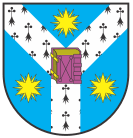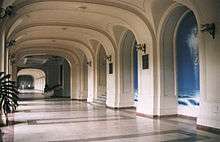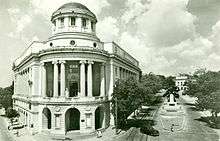Alexandru Ioan Cuza University
| Universitatea Alexandru Ioan Cuza | |
 | |
Former names |
University of Iași Mihăileană University Cuza Vodă University |
|---|---|
| Motto | Per libertatem ad veritatem (Latin) |
Motto in English | Through freedom to truth |
| Type | Public |
| Established | 1860 |
| Endowment | US $ 120 million[1] |
| Rector | Vasile Ișan |
Academic staff | 780 |
| Students | 25,724 (2013-2014)[2] |
| Undergraduates | 18,594 |
| Postgraduates | 7,200 |
| Location | Iași, Romania |
| Campus | Urban |
| Affiliations |
Universitaria Consortium Coimbra Group Utrecht Network EUA IAU AUF RUFAC |
| Website |
www |
|
| |
The Alexandru Ioan Cuza University (Romanian: Universitatea "Alexandru Ioan Cuza") is a public university located in Iași, Romania. Founded one year after the establishment of the Romanian state, by an 1860 decree of Prince Alexandru Ioan Cuza, under whom the former Academia Mihăileană was converted to a university, the University of Iași, as it was named at first, is the oldest university of Romania, and one of its advanced research and education institutions.[3]
Its coat of arms with the Y shaped heraldic pall simbolizes the three initiatives which led to the foundation of the University: the Trei Ierarhi Collegium, the Academia Mihăileană, the University of Iași. The central element is the Bible, the classic emblem of higher education. The three shiny stars stand for the three faculties of the University at its foundation moment, Philosophy, Law and Theology, on blue and argent background, the same colors used on the Cuza family shield.
In 2008, for the third year in a row, the Alexandru Ioan Cuza University was placed first in the national research ranking compiled on the basis of Shanghai criteria.[2][4] The University is a member of some of the most important university networks and associations: the Coimbra Group (CG), Utrecht Network, European University Association (EUA), International Association of Universities (IAU), University Agency of Francophony (AUF), the Network of Francophone Universities (RUFAC) and also of the Universitaria Consortium (the group of elite Romanian universities).
In the 2012 QS World University Rankings, Alexandru Ioan Cuza University was included in the Top 700 universities of the world, together with three other Romanian universities.[5][6]
History

Iași has a long tradition in higher education, the first institute that functioned on the territory of Romania was Academia Vasiliană founded in 1640 by the Moldavian Prince Vasile Lupu,[7] followed, in 1707, by Princely Academy of Iași. The Princely Academy (renamed, in 1812, The Academy of Filology and Science) matched up to the standards of the other European Academies of the time and the Romanian language gained importance over the Greek language.
The foundation, in 1835, of the Academia Mihăileană is considered a landmark in the history of Romanian higher education. The Academia Mihăileană was created under the auspices of Prince Mihail Sturdza (hence its name), striving for progress and for "meeting the standards of the enlightened Europe". Three faculties were set up: the Faculty of Law, the Faculty of Philosophy and the Faculty of Theology and the curriculum resembled to a great extent that of Austrian and German academies.
After Unification of the Romanian Principalities of Moldavia and Wallachia by the Prince Alexandru Ioan Cuza, the inauguration, at 26 October 1860, of the University of Iași, the first Romanian modern university, was to be a stepping stone to modern higher education in Romania.
Grounds
The university grounds lie on Copou Hill in the northern part of the city.
The main university building was built between 1893 and 1897 on the site of the first Iași National Theatre which had burned down in 1888. The Hall of the University, known as The Hall of the Lost Footsteps, served as a parliamentary debating chamber between 1917 and 1918 when, during the Great War, Iași was the capital of Romania. In 1967, the painter Sabin Bălaşa started creating a series of strongly romanticized frescoes for the arcades.
Academics

Today the university is made up of 15 faculties (Biology, Chemistry, Computer Science, Economics and Business Administration, Geography and Geology, History, Law, Letters, Mathematics, Philosophy and Social-Political Sciences, Physical Education and Sports, Physics, Psychology and Education Sciences, Orthodox Theology, Catholic Theology), and one department (Centre for European Studies),[8] with more than 25,000 students.
Library
Founded in 1835 as Library of the Academia Mihăileană, Mihai Eminescu Central University Library holds about 2.5 million volumes that form the main collection and an old and rare collection, from the 15th to the 19th centuries, of over 100,000 Romanian and foreign documents, manuscripts, books, albums, maps, stamps, archive items.
The building that houses the main collection is located at the base of Copou Hill, and it was built between 1930 and 1935 to serve as the headquarters of King Ferdinand's Cultural Foundation. The triangular building with Doric columns and cupola is decorated with Carrara marble and Venetian mosaics. By 1945, the Foundation library had become one of the biggest in the country. Today, the library is the largest in Moldavia, with a great number of manuscripts and old books.
Research
Alexandru Ioan Cuza University is involved in over 400 national and international research projects, with the logistic support of 24 research centres.
Gallery
-
The Main Building (Corp A) of the Al.I.Cuza University
-

Building B, front view
-

Building C, Faculty of Computer Science
-

Al.I.Cuza University, building D
-

The Mihai Eminescu Central University Library
Faculty, alumni and rectors
- Petre Andrei
- Vasile Arvinte
- Viorel Barbu
- Simion Bărnuţiu
- Traian Bratu
- Dimitrie Brândză
- Ioan Cantacuzino
- A. C. Cuza
- Nicolae Daşcovici
- Emil Dumea
- Tahsin Gemil
- Dimitrie Gusti
- Dragomir Hurmuzescu
- Iorgu Iordan
- Nicolae Iorga
- Gheorghe Ivănescu
- Titu Maiorescu
- Grigore Moisil
- Dumitru Oprea
- Constantin Ion Parhon
- Ion Petrovici
- Alexandru Philippide
- Luca Piţu
- Alexandru-Florin Platon
- Dimitrie Pompeiu
- Constantin Stere
- Simion Stoilow
- Mihai Răzvan Ungureanu
- Alexandru Dimitrie Xenopol
- Alexandru Zub
- Ion Strat (1860-1861)
- Filaret Scriban (1861-1862)
- Nicolae Ionescu (1862-1863)
- Titu Maiorescu (1863-1867)
- Ștefan Micle (1867-1875)
- Petru Suciu (1875-1880)
- Nicolae Culianu (1880-1898)
- Alexandru D. Xenopol (1898-1901)
- Constantin Climescu (1901-1907)
- George Bogdan (1907-1913)
- Constantin Stere (1913-1916)
- Matei B. Cantacuzino (1916-1918)
- Nicolae Leon (1918)
- Iulian Teodorescu (1919-1920)
- Nicolae Leon (1920-1921)
- Traian Bratu (1921-1922)
- Ion Th. Simionescu (1922-1923)
- Alexandru Slătineanu (1923-1926)
- Petru Bogdan (1926-1932)
- Traian Bratu (1932-1938)
- Ion Tănăsescu (1938-1940)
- Virgil Nițulescu (1940-1941)
- Mihail D. David (1941-1944)
- Alexandru Myller (1944-1945)
- Leon Ballif (1947-1948)
- Jean Livescu (1948-1955)
- Ion L. Creangă (1955-1972)
- Mihai Todosia (1972-1981)
- Viorel Barbu (1981-1989)
- Petre Mîlcomete (1989)
- Petru Călin Ignat (1989-1992)
- Gheorghe Popa (1992-2000)
- Dumitru Oprea (2000-2008)
- Vasile Ișan (2008-)
See also
Notes and references
- ↑ http://www.ziaruldeiasi.ro/local/universitatea-cuza-va-avea-in-2007-un-buget-egal-cu-cel-al-orasului~ni470a Budget] (Romanian)
- 1 2 "About the university". Universitatea „Alexandru Ioan Cuza” din Iași. Retrieved 19 July 2015.
- ↑ Institutii de invatamant superior clasificate ca universitati de cercetare avansata si educatie
- ↑ "Topul universitatilor din Romania, realizat de Ad Astra". Retrieved 19 July 2015.
- ↑ "Alexandru Ioan Cuza University". topuniversities.com. 7 December 2012.
- ↑ "Cele mai bune universităţi din lume. Patru universităţi româneşti sunt printre primele 700" (in Romanian). Adevarul. 11 September 2012.
- ↑ "Study in Romanian - Learn & Live Freely". Retrieved 19 July 2015.
- ↑ Alexandru Ioan Cuza University at aracis.ro
External links
| Wikimedia Commons has media related to University of Iași. |
| ||||||||||||||||||||||||||||||||||||||||||
| ||||||
| ||||||||||
Coordinates: 47°10′27″N 27°34′18″E / 47.174231°N 27.571691°E